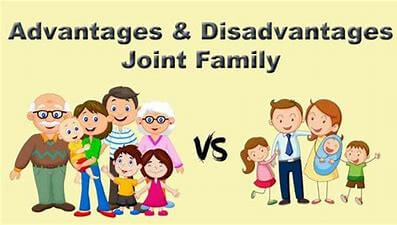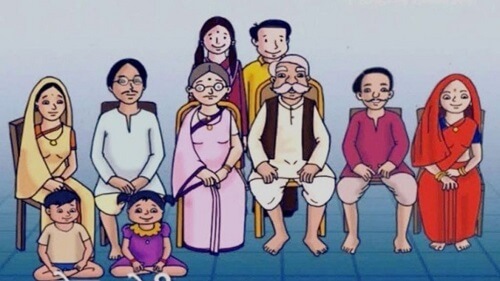Advantages and Disadvantages of Joint FamilyJoint FamilyA big undivided family in which multiple generations share a home is a joint family (also known as an unbroken family, shared household, or extended family structure). In a combined family, the grandparents, father, mother, and kids reside under one roof. Every member in such a family system: is expected to contribute financially to the common fund, share ownership of household property equally, protect the common property, cooperate, respect, and support one another, consume meals prepared in the communal kitchen, and pay for daily expenses from the common fund. 
After getting married, the son in these households does not distance himself. Instead, he shares a home with the rest of his family and lives there with his wife and their children. Commonly, the leader of a joint family is the oldest male member. He has trustee-like authority and responsibilities. He can make choices for the family's financial and social well-being Advantages of Joint Family1. Your child won't experience loneliness For kids, a united family is ideal. Without having to worry about your child's requirements, you can go to work. You'll feed him with your family. Additionally, they'll look after them well. The cousins of your child can play with him as well. He won't ever feel so lonely in your home as a result. He will consistently have pals. 2. You will discover the value of sharing Children raised in nuclear families versus joint families will differ significantly from one another. Your child will become more social if he grows up in a shared family. He will also be quite good at sharing stuff. Their cousins have access to their possessions. As a result, sharing has been a habit of theirs since childhood. Children share and stroll together. Before consuming his chocolate, your kid will share it with his siblings. He may dislike giving items to his cousins. But this will equip him for life in the real world. People will like you naturally if you share your possessions. You'll learn the value of "we" through living in a joint family. 3. You'll show everyone respect If you are raised in a large family, you will naturally begin to respect everyone. You'll share a home with a lot of older people. As a result, you will develop the habit of controlling your tongue. You will respect them and follow their instructions as well. This will influence how you come across as a whole. Everyone enjoys being respected by others. 4. Compatibility You will never feel alone if you live with your family in a joint household. Furthermore, your kids won't ever get bored. Playtime with their siblings is always an option. Never will your kids experience loneliness. They will constantly have cousins. Your kids will have the best buddy for life in this great, wide world. They can talk to their cousins about their issues with ease. Additionally, their cousins will support them at all times. 5. Families Values For every youngster, values are crucial. Every parent strives to instill moral principles in their kids. But if you come from a nuclear family, you could find it challenging to do this. To earn money, you must report to work. You will have less time to spend with your kids as a result. Your children will naturally learn family values if you live with a combined family. They will pick up crucial morals like compassion and generosity and learn to respect everyone as well. 6. Additional Education to Textbooks Your children will learn fascinating information from their grandparents, aunts, and cousins. They won't be limited to just scholarly works. Although they will only be able to earn good grades by using these books, these novels won't assist kids in the real world. Your children will learn about their time if they live with your parents. They will be made aware of their difficulties. They will comprehend that academic texts are only part of it. In life, a lot of things are essential. 
7. Support System Working parents will benefit from the shared family arrangement. In your home, a trustworthy individual will always be present. They'll look after your children nicely. Uncles, parents, and aunts will all take care of your youngster. Because of this, you don't need to worry about their safety. Parents will have more flexibility as a result. They can interact with others. Additionally, they can go out to dinner or office parties without fearing for their child. 8. Possibility of Finance All employed family members will assist you in managing household expenses if you live in a joint family. Consequently, you can pay only some of the payments. Also serving as a safety net is this mechanism. Other family members will support a person if they are experiencing financial loss. 9. Love and Gratitude You will get a lot of attention and affection if you are a joint family member. The members of your family will support you if you are depressed. You'll never experience loneliness. The people in your family will help you. The members of your family will look after you if you become ill. If you live alone, you can never feel this. You will experience unfathomable levels of love in a blended family. 10. Develop Social Skills You will naturally pick up social skills if you live with others in a large family. Your child's personality will be shaped by your relatives, nephews, and elders. They'll be able to interact with others effectively. Your kids will so fit into society with ease. New pals are simple for them to make. Disadvantages of Joint Family1. A Lack of Privacy The most significant drawback of joint family life is this. Your privacy will also be endangered if you live in a shared family. You'll never be left home alone. You should cry onto your bed if you're feeling lonely. In a shared family, though, this is not conceivable. Everyone in the family is familiar with everyone else. As a result, they might occasionally meddle in your daily affairs. The majority of people don't want anyone meddling in their daily affairs. People don't like to divulge all of their secrets to their families. Your family will make every effort to assist you. But occasionally, this can be infuriating. 2. Parental Interference Being a parent will be challenging if you live in a large household. Your relatives might obstruct your parenting approach. They'll give you advice on what to do. For new mothers, this cannot be very pleasant. These suggestions can cause them to get perplexed. 3. Financial Disagreements Finances may also be a source of argument. Each individual will bolster the household fund. However, this money will be managed by your family's leader. They will choose how to use this funding. Other family members occasionally disapprove of the family head's decisions. As a result, this could result in disputes and arguments. 4. Differences in Opinion on Shopping and Cooking Issues The women in joint families almost always prepare meals for the entire family. Due to differences in tastes, cooking methods, and health concerns, everyone has distinct preferences. The women would debate this and have some debates about it. Also, family members, particularly women, would become divided over purchasing issues. You cannot give every woman the same amount of money to spend however you like. Everybody has their preferences. The differences in generational, gender and educational attainment are crucial. So, it may also lead to dissatisfaction among family members. 5. Cannot Make Your Own Decisions You are not allowed to make your own decisions. Any decision, no matter how small, shall be discussed with all the elders before being made. No one is permitted to make decisions in the household without consulting the wiser members. 6. Children Lack Independence Children cannot make independent decisions because they were born into a joint family. They struggle because they have a tendency to talk to their elders about everything. As a result, they are indecisive and lack confidence. Due to elders' persistent interference in their decision-making, children's personalities do not emerge. ConclusionA joint family has both benefits and drawbacks. It will be very challenging for you to transition to a joint family if you now live in a nuclear family. Most households can only have a maximum of four people. However, there are still a lot of families that live together in towns and cities. Living as part of a large family has numerous benefits if there is harmony among the family members.
Next TopicAdvantages and Disadvantages of Computer
|
 For Videos Join Our Youtube Channel: Join Now
For Videos Join Our Youtube Channel: Join Now
Feedback
- Send your Feedback to [email protected]
Help Others, Please Share










